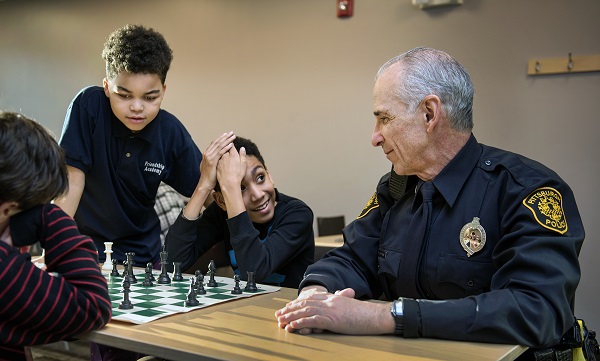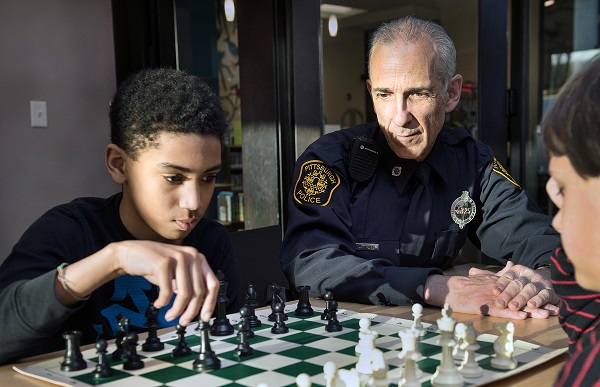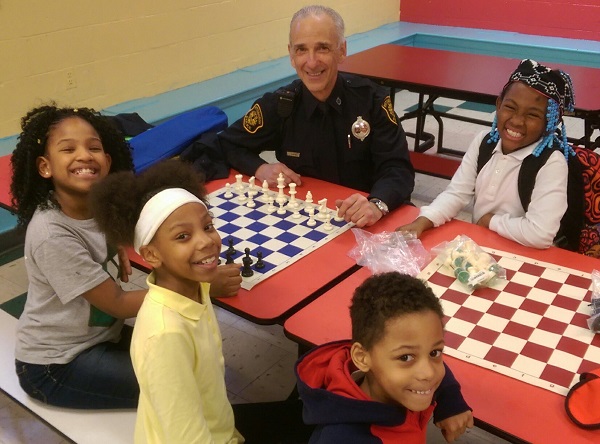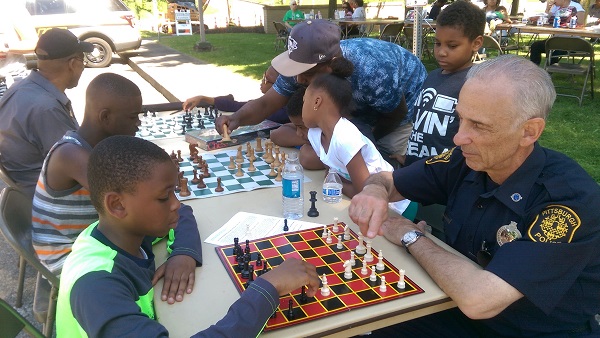
Kidsburgh Hero: David Shifren and the Pittsburgh Police Chess Club
Josh Lellock, 14, is feeling pretty good about himself after scoring a victory over a Pittsburgh police officer.
The Beltzhoover teen did something practically unheard of among his circle of friends who interact with Pittsburgh Police Officer David Shifren, a community resource officer based in the city’s Zone 4 region.
Josh beat Officer Shifren in a game of chess.
“I’ve only been beaten twice in two-and-a-half years, including last week, by one of my students,” Shifren says. “Josh was so excited he had to leave the room until he could compose himself.”
“It was a lot of luck, honestly, because he’s a very good player,” says Josh, who regularly plays as a member of the Pittsburgh Police Chess Club at Knoxville Library.

Shifren started the Pittsburgh Police Chess Club two-and-a-half years ago as a way of building better relations between the police and the community. His job involves interacting with the families living in his Zone 4 neighborhoods of Squirrel Hill, Point Breeze and central Oakland.
As part of his position, Shifren attends community meetings, studies trends in local crimes, writes weekly reports – and plays chess with kids.
The club, which launched at the Hazelwood Library, is now citywide and open to all Pittsburgh kids from ages 8 through 16. There is no cost to join and all levels of players, from beginners to advanced, are welcome to attend the weekly meetings.
Shifren is working with other police departments to help them start their own chess clubs for kids, including Aspinwall and Wilkinsburg.
Shifren’s unlikely approach to his job runs parallel to his approach to his career. He came to Pittsburgh in 1989 to complete a master’s degree in fiction writing at the University of Pittsburgh. As a novelist and screenwriter, he became acquainted with the city police when he arranged a ride-along as part of his research for a young people’s mystery he was writing. Intrigued, he enrolled at the police academy at age 58 and joined the Pittsburgh police force.

Shifren, who learned how to play chess as a child from his father, says the game teaches kids social skills and important lessons in dealing with others.
“The prime thing they learn is to see ahead and think about the consequences of their actions,” he says.
“Every kid has a cell phone, access to a computer and video games, which are largely based on reflexes. Chess slows you down, so you can deliberate more. That slowed-down thinking serves kids well.”
And since chess is all about anticipating the other player’s move, the game can teach empathy for others, as well as self-discipline and persistence. When kids join the chess club, they sign a “Rules of Conduct” contract that includes “no shouting, no throwing things, and no gloating allowed.”
“Chess also teaches kids that there are rules and consequences for not following them,” Shifren says. “They also learn about being a gracious winner and that size, gender and age don’t matter.”

Working with kids – especially those living in more challenging neighborhoods – has been personally gratifying for Shifren, who plans to continue expanding chess clubs to other neighborhoods.
“Whenever we have any community party, gathering or potluck, I always bring a half-dozen chess sets and set them up,” he says. “It’s like a magnet. Chess boards draw people.”
Pittsburgh Police Chess Club schedule
Officer David Shifren and Officer Tiffany Kline-Costa teach classes at the following locations:
Hazelwood Carnegie Library, 5-7 p.m. Tuesdays
Beechview Carnegie Library, 4-5 p.m. Wednesdays
Sheraden Carnegie Library, 3-4 p.m. Thursdays
Dan Marino Fieldhouse, Frazier/Dawson Streets, South Oakland, 5-7 p.m. Thursdays
Knoxville Carnegie Library, 4-5 p.m. Wednesdays
West End Carnegie Library, 2-3 p.m. Thursdays (starting Aug. 30)